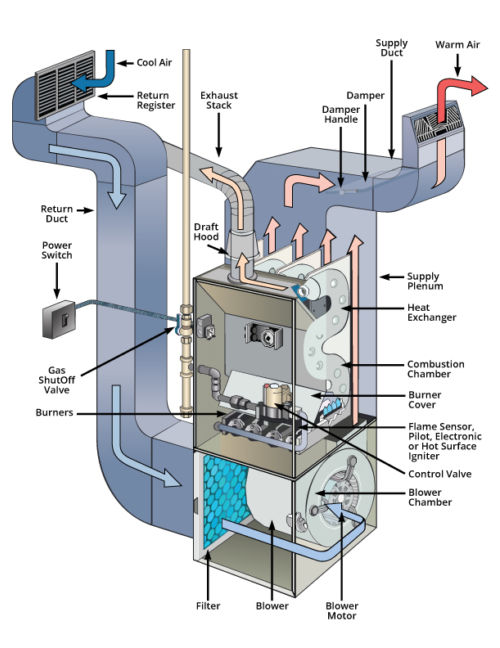How Much Does Furnace Repair Cost in Phoenix?
February 21, 2018
Updated June 2024
Stuck with a busted furnace?
No worries—we can help. But the first question on your mind is probably, “How much is a furnace repair going to cost me?”
The cost to repair a furnace in Phoenix ranges from $149 to $5,500, but the average price is usually around $1,500.
Wondering why there’s such a big price range? Well, the cost of a furnace repair depends on these cost factors...
The type of repair you need
Your furnace warranty coverage
The contractor you hire
We’ll go into each of these cost factors in more detail...
Need a tech ASAP? Just contact us.We’ll send over a professional to get your furnace working properly again.
Cost factor #1: The type of repair you need
The cost of a repair mainly depends on what’s actually wrong with the furnace. But, because furnaces contain so many different parts and components, it’s hard to pinpoint what you’ll end up paying without inspecting your unit.
To give you an idea of how different furnace parts necessitate different repair prices, we’ve listed some common repairs below (from least expensive to most expensive):
Broken thermostat repair: $320 to $2,148
Flame sensor fix: $149 to $405
Blower motor repair: $1,279 to $2,818
Replacing faulty ignitors: $350 to $980
Heat exchanger repair: $1,250 to $5,500

The many parts of a gas furnace
For more information about common furnace problems, read our article, “Top 3 Furnace Problems in Phoenix.”
All furnace repairs have 3 aspects to them:
How badly the furnace part is damaged: The worse the damage, the more expensive it will be to fix the part. If the part is badly damaged, you’ll likely have to replace it altogether.
The labor to replace/fix the broken part: The longer it takes to fix a broken furnace component, the more expensive it will be.
The replacement part: Some parts are more expensive than others. For example, a heat exchanger is MUCH more expensive than, say, a thermostat.
Cost factor #2: Your furnace warranty coverage
Warranties can help alleviate some of the financial burden of a furnace repair. However, how much your warranty helps with the cost depends on…
The type of warranty you have: What warranties cover varies from manufacturer to manufacturer. For example, many warranties cover important furnace components anywhere from 1 to 10 years, and the heat exchanger could be covered up to 20 years.
Most standard warranties are limited, meaning that they only cover the part (if it meets certain requirements) and not the labor.
You’ll need to look up your specific warranty on your furnace manufacturer's website or in the paperwork included with your furnace installation. When in doubt, contact the contractor who first installed your furnace and they can usually help you determine what your furnace warranty covers.
If you registered your furnace with the manufacturer: If you didn’t register your furnace with the manufacturer when you first had the furnace installed, the manufacturer may not consider the warranty valid.
Who maintains your furnace: Your furnace needs to be maintained by an authorized technician so all repairs and cleanings are done in accordance to the manufacturer's specifications. If someone who isn’t authorized tries to repair your furnace, the warranty may be void.
How often a professional maintains your furnace: Most warranties require that your furnace be maintained annually by a professional for the warranty to be valid.
Cost factor #3: The contractor you hire
Who you hire to repair your furnace will also determine what you’ll pay. Some contractors charge more for their services than others, and when it comes to furnace repairs, you get what you pay for.
What we mean is low-quality contractors will generally charge less for their services, but they won’t do as good of a job on the repair. And a poor repair only leads to more repairs and discomfort down the road, so it’s better to hire a professional who can do the job right the first time.
Here are a few tips to choose a quality contractor:
Make sure the contractor is licensed and insured, so you can rest assured the job is meeting local code requirements and if something goes wrong on the job you won’t be held responsible.
Check the online customer reviews to make sure they have good ratings and no unresolved complaints filed with the Better Business Bureau.
Get written estimates from multiple contractors so you can gauge what they charge and compare them with each other. The more informed you are as a homeowner, the better you can negotiate price and not fall for pricing scams.
Need a furnace repair in the Phoenix area?
We can help. Schedule an appointment online or give us a call and we’ll quickly send one of our experienced techs to fix the issue for you.
Related reading:
Get 10% off (Up to $150)

Ty Lindsay is the Director of Field Operations at Patrick Riley | Isley’s and a 15-year veteran of the plumbing and HVAC trades. In 2010, Ty earned his Journeyman’s plumbing license. He became a Master Plumber five years later and earned his Journeyman HVAC technician’s license that same year. Ty’s breadth of knowledge in plumbing and HVAC includes both residential and commercial work. He’s been a loyal member of the Patrick Riley | Isley’s team since 2016.
- Posted in:
- Buyer's Guide
